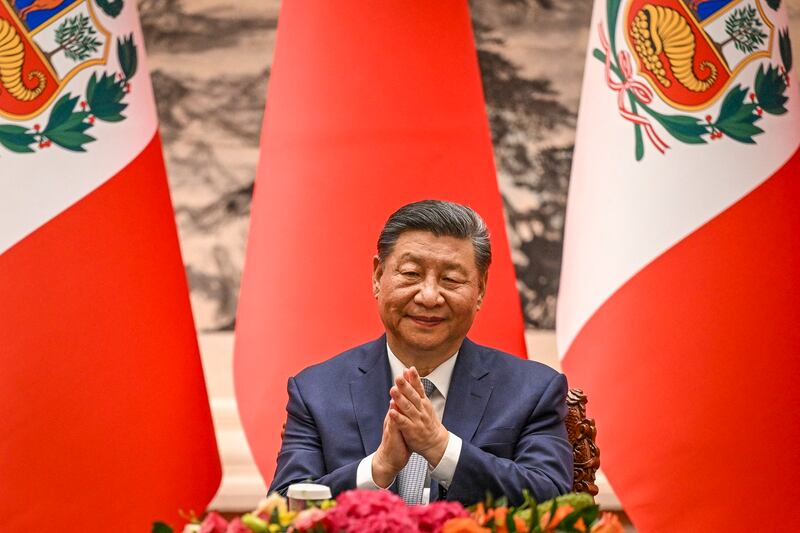Chinese President Xi Jinping is a “dictator” who broke his country’s 1984 treaty with the United Kingdom about Hong Kong and should not be trusted, the last governor of the former British colony has said.
In a video released by the London-based Hong Kong Watch on Sunday ahead of Monday’s 27th anniversary of the July 1, 1997, handover of the territory from British to Chinese control, Chris Patten said Beijing had not lived up to the terms of its deal with the United Kingdom.
Instead of respecting Hong Kong's pledged autonomy and status as a free society for 50 years, he said, Beijing had exported its dictatorship.
"What's happened in the years since then is that the Chinese Communist Party, who've made it clear no one can trust them further than you can spit, … trashed a treaty which had been lodged at the United Nations," Patten said in the video posted to X.
Related stories
[ Hong Kong’s US offices should be closed, activists sayOpens in new window ]
[ Hong Kong's new security law sparks global protests, warningsOpens in new window ]
“They said it was simply a historic document. It was not. It was a treaty,” he said, before acknowledging that “for a few years after 1997 things went pretty well,” with Hong Kong remaining mostly free.
“All that changed with Xi Jinping, China's present – let’s not beat around the bush – China's present dictator, who came to power at a time when the Chinese communist leadership were getting increasingly worried about things slipping out of control,” he said.
Once ranked the third most free society in the world, Hong Kong has since the late 2010s suffered a "descent into tyranny," the U.S.-based Cato Institute said in a report on global freedom released late last year amid Beijing's growing assertions of control over the territory.
‘One country, two systems’
Under the 1984 treaty signed by British Prime Minister Margaret Thatcher and Chinese Premier Zhao Ziyang, Hong Kong was promised continuing autonomy and its British-style legal system under Chinese sovereignty until at least 2047, when the treaty would lapse.
But that did not gel with Beijing’s shifting political goals, Patten said.

Xi and his government, he said, had looked to the growing sense of freedom and autonomy enjoyed by Hongkongers and perceived a threat on their own doorstep to their plans to exert increasing control over their society and export a model of authoritarian governance.
“Xi Jinping and his colleagues were having none of it,” Patten said.
“In particular, they were very worried about the extent to which Hong Kong reflected all those values which they were trying to stamp out: freedom of speech, freedom of association, freedom of religion, the rule of law, and all those things they don't understand,” he said.
The former Hong Kong governor said he regretted how things had turned out given that “more than half, and probably two thirds” of the territory’s population at the time of the handover had arrived there as refugees after escaping communism on China’s mainland.
Liu Pengyu, a spokesperson for the Chinese Embassy in Washington, told Radio Free Asia that Patten’s video statement on Hong Kong “is a complete reversal of black and white” and “smears” China’s leaders.
“Hong Kong affairs are purely China’s internal affairs that brook no external interference,” Liu said, calling the implementation of the “One Country, Two Systems” model since 1997 a clear “success.”
“Hong Kong has actively integrated itself into China’s development and continues to serve as an important bridge and window between the Chinese mainland and the rest of the world,” he said.
Patten should “have awareness of his role” as the last colonial administrator of the Chinese territory and “get a clear understanding of the change of time,” Liu added, rather than supporting “hysterical anti-China elements who attempt to create chaos in Hong Kong.”
Exhibition in Taiwan
At an exhibition held in Taipei on Monday to commemorate the handover of Hong Kong to China, attendees told RFA that they saw the anniversary of the handover as a solemn day.
One attendee, who gave only their family name of Chen for fear of arrest in Hong Kong, said the event had to be held in Taiwan because local authorities back home were making examples of anyone who negatively portrayed the anniversary of the handover in public.
Hong Kong police had even arrested more people who took part in the city’s 2019 protests, she said, in order to send out a message.
"In these past few days, the Hong Kong government has been arresting people who participated in the protests,” Chen said. “They especially arrest people on significant days to intimidate everyone from coming out, which has been a tactic they've used for years.”
“But Hong Kong people are resilient. Like on June 4 just passed, many still came out,” she said, referring to the date of the Tiananmen Square massacre. “People find their own ways to commemorate, and this spirit of resistance of being water and widespread still persists.”
The event’s organizer, Fu Tang, said the erosion of liberties in Hong Kong was complete, with even simple statements now criminal.
“Nowadays in Hong Kong, there's no way to say something they don't like,” Fu said. “Just the other day, someone said ‘Revolution is not a crime, to rebel is justified,’ and then the person got arrested.”
“Over the past 27 years, freedom has been declining, and repression against us has been getting worse,” he said. “July 1st marks Hong Kong's return, but Hong Kongers feel it's the day of being taken."
RFA Cantonese contributed reporting. Edited by Malcolm Foster.
